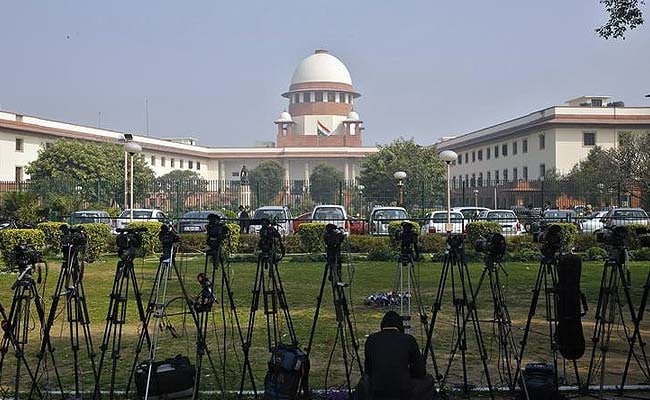
Supreme Court of India (Reuters)
New Delhi:
The Indian Railways will have to pay compensation to passengers for any untoward incident during their journey, including death due to cardiac arrest while running along the moving train leaving the platform.
The Supreme Court, dealing with a case, declined the Centre's plea challenging the Madras High Court award of compensation of Rs.4 lakh to the widow and children of Durai Somnathan, who had died of cardiac arrest while running along the moving train from which his wife and daughter could not get down.
The apex court bench of Chief Justice H.L. Dattu, Justice A.K.Sikri and Justice R.K.Agrawal on Thursday declined the Centre's plea as Attorney General Mukul Rohatgi told the court whether running along a moving train could be considered as an "untoward incident".
The court said that compensation amount of Rs.4 lakh would attract six percent interest.
Finding that the court was not inclined to entertain the plea, Rohatgi told the court that the railways was ready to pay the compensation but urged the court to keep the question of law open.
Somnathan along with his wife and daughter March 4, 2008, had bought a joint ticket at Dindigul Junction for Kumbakonam town in Tamil Nadu's Thanjavur district.
They boarded a train but just when it was about to move, they realised that they have boarded a wrong train, which was headed to Erode.
Somnathan deboarded the train but before his wife and daughter could get down, the train started moving. He ran along the moving train shouting for his wife and daughter.
As he was running along the moving train, he developed chest pain and collapsed on the platform.
The Railway Claims Tribunal at Chennai while declining the plea for compensation held that though Durai Somnathan was a bonafide passenger, his case did not fall within the ambit of "untoward incident" under Section 123 (C) of the Railway Claims Tribunal Act, 1966.
The railways while opposing the plea of widow Elambal and four children for compensation told the high court that Somnathan's death was not caused by "untoward incident".
However, the Madras High Court by its judgment of September 17, 2013, held that the death due to "cardiac arrest" came within the definition of the "untoward incident" as the same is not covered under exceptions to "untoward incident" under Section 124 of the Railways Act.
Having held so, the high court granted Elambal and her children the compensation of Rs.4 lakh along with an interest of six percent from the date of incident and nine percent from the date of its order.
The Supreme Court, dealing with a case, declined the Centre's plea challenging the Madras High Court award of compensation of Rs.4 lakh to the widow and children of Durai Somnathan, who had died of cardiac arrest while running along the moving train from which his wife and daughter could not get down.
The apex court bench of Chief Justice H.L. Dattu, Justice A.K.Sikri and Justice R.K.Agrawal on Thursday declined the Centre's plea as Attorney General Mukul Rohatgi told the court whether running along a moving train could be considered as an "untoward incident".
The court said that compensation amount of Rs.4 lakh would attract six percent interest.
Finding that the court was not inclined to entertain the plea, Rohatgi told the court that the railways was ready to pay the compensation but urged the court to keep the question of law open.
Somnathan along with his wife and daughter March 4, 2008, had bought a joint ticket at Dindigul Junction for Kumbakonam town in Tamil Nadu's Thanjavur district.
They boarded a train but just when it was about to move, they realised that they have boarded a wrong train, which was headed to Erode.
Somnathan deboarded the train but before his wife and daughter could get down, the train started moving. He ran along the moving train shouting for his wife and daughter.
As he was running along the moving train, he developed chest pain and collapsed on the platform.
The Railway Claims Tribunal at Chennai while declining the plea for compensation held that though Durai Somnathan was a bonafide passenger, his case did not fall within the ambit of "untoward incident" under Section 123 (C) of the Railway Claims Tribunal Act, 1966.
The railways while opposing the plea of widow Elambal and four children for compensation told the high court that Somnathan's death was not caused by "untoward incident".
However, the Madras High Court by its judgment of September 17, 2013, held that the death due to "cardiac arrest" came within the definition of the "untoward incident" as the same is not covered under exceptions to "untoward incident" under Section 124 of the Railways Act.
Having held so, the high court granted Elambal and her children the compensation of Rs.4 lakh along with an interest of six percent from the date of incident and nine percent from the date of its order.
Track Latest News Live on NDTV.com and get news updates from India and around the world

